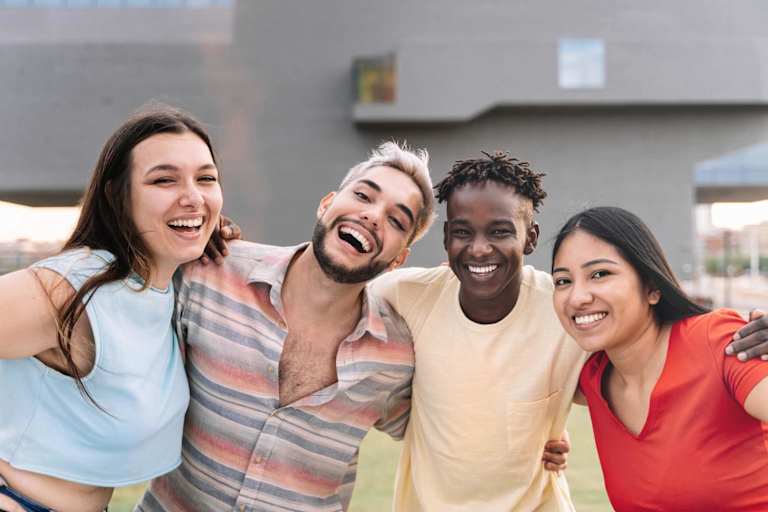Taking Action on the Day of Silence for LGBTQ+ Students
- Two University of Virginia students organized the first Day of Silence in 1996.
- The Day of Silence aims to highlight how LGBTQ+ people are silenced every day.
- The Day of Silence is followed by the Night of Noise, a time to break the silence.
- There are many ways to get involved and support LGBTQ+ folks on this important day.
On the Day of Silence, LGBTQ+ students and allies take a vow of silence to push back against discrimination in school settings. They reclaim the silence imposed on LGBTQ+ people and make it into a powerful vehicle for raising people’s awareness. Learn what the Day of Silence aims to accomplish, how people observe it, and how to get involved and show your support.
What Is the Day of Silence?
In 1996, University of Virginia students Maria Pulzetti and Jesse Gilliam launched the first Day of Silence. Participants stayed silent the entire day, including during classes, meals, and time reserved for socializing.
Since 1996, the Day of Silence has typically been on the second or third Friday in April. Over 26 years after the first Day of Silence, hundreds of thousands of students now commemorate the day each year.
The Day of Silence is meant to highlight how families and institutions silence LGBTQ+ people, specifically youth, every day. On the Day of Silence, LGBTQ+ students purposefully deny the world their voices to make the silence palpable.
Each year, students at K-12 schools and college campuses nationwide observe the Day of Silence. Participants typically carry small cards to give to others, letting them know why they are not responding on the day.
Some Day of Silence participants also find other creative ways to highlight the LGBTQ+ people’s experiences. In 2001, a group of student activists at Michigan State University, myself included, stood in the middle of campus in shifts throughout the day.
We were members of several identity-based organizations, bringing together hundreds of historically excluded students and noting the diversity within LGBTQ+ communities. Dressed in all black, we taped their mouths shut, placed slur words across our bodies, and used makeup to appear injured to draw a connection between bigotry, silence, and violence.
How to Celebrate the Day of Silence Today
Recently, many Day of Silence observances have been followed by Break the Silence and/or Night of Noise events. These can include rallies or protests, spoken word and poetry performances, or speakers to amplify the silenced voices. Often, students share their experiences and reflections of the day to deepen their learning and personal development.
Breaking the silence can be important, as the Day of Silence may be emotional for many students. Being able to reflect and be with others to process the day can help minimize any unintended negative consequences. Breaking the silence is also an opportunity for some to seek help and resources.
These events may employ culturally-competent counselors who can talk to students throughout the day and night. Break the Silence is also an excellent opportunity to discuss commitments and actions necessary to make schools more inclusive spaces for all LGBTQ+ people, especially students.
Why This Day Matters to LGBTQ+ Students
Young people today, including college students, are often told how much easier they have it than the generations preceding them. While that may be true in some ways — it is easier to find representation in many forms of media, for example — the last few years, in particular, have shown how much work there still is to do.
In several states, young people and some of their families and teachers are standing up to legislative efforts to ban trans athletes from playing sports, further curtail LGBTQ+ access to affirming and accessible healthcare, and silence certain speech.
Institutions are still actively silencing LGBTQ+ students, making the Day of Silence and Night of Noise more relevant than ever.
Getting Involved and Supporting LGBTQ Students
- Whether you’re part of the LGBTQ+ community or not, and whether you’re a student or not, you can participate in the Day of Silence and Break the Silence. GLSEN’s Day of Silence page has a number of resources to get you started.
- If you’re not participating, you can support those who are by accompanying them and intervening if they experience resistance or harassment. You can also educate people who ask questions.
- If your school does not support LGBTQ+ students and opposes holding the Day of Silence, Lambda Legal has created a contact form and an FAQ sheet to help students advocate for their rights.
- Check out the 2021 and the 2022 Day of Silence student zines, to view art and read essays by students.
- Write to your local or school paper about the Day of Silence and advocate for LGBTQ+ students. Share your own story and experiences.
- Decide to educate yourself about an aspect of the LGBTQ+ community you’re not familiar with. This can include learning about LGBTQ+ artists and poets, reading books about Indigenous queer, trans, and Two-Spirit people, or watching “Deaf U,” a TV show about Deaf students at Gallaudet University.
Be Loud With Your Silence
The Day of Silence is more than 26 years old. Started by college students, you can lead this day of advocacy and spread the powerful message of LGBTQ+ liberation across states and countries. Let’s show support for this movement by being loud with our silence and using it to resolve to work to amplify all marginalized people.





